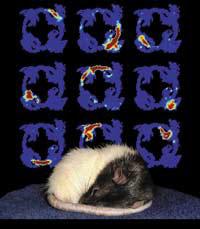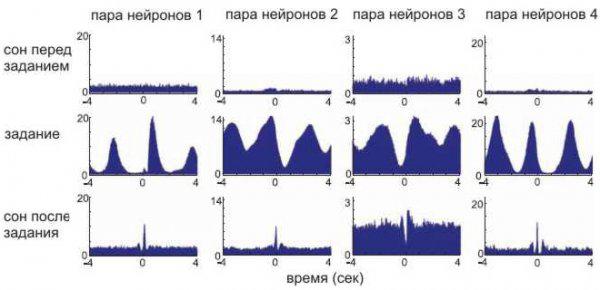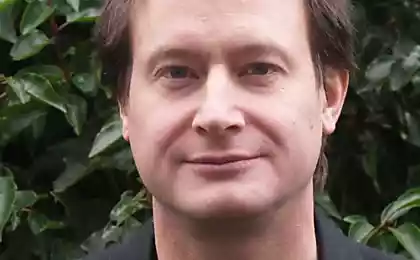952
The brain during sleep "loses" the daily events with the sevenfold acceleration (2 photos + text)

US neuroscientists have found that in the prefrontal cortex (Prefrontal cortex) rat brain during sleep occurs seven times fast playback a series of nerve impulses, which were observed during wakefulness. This "scrolling" daily impressions, apparently, it is necessary for the formation of enduring memories. The authors suggest that they found the process is a "rewriting" of information from short-term memory, which is the responsibility hippocampus in non-volatile memory, under the control of the prefrontal cortex.
Today, scientists have been fairly well understood in the cellular and molecular nature of memory, as well as in what part of the brain and in what sequence involved in memorizing, subsequent storage and playback (remembering) the information (see ref. Below). It is known that many of the key processes associated with securing memories ("memory consolidation") taking place in a dream, and a crucial role in these processes is played by the hippocampus. If this little part of the brain fails, people (or animals) lose their ability to remember anything, but all the old memories are stored.
It is experimentally shown that hippocampal neurons during sleep reproduce the same series of nerve impulses, which were observed during wakefulness (such as during learning any problem). Apparently, this replay daily experience necessary to safely experience svezhepriobretennoy "rewrite" of the hippocampus in those parts of the brain that are responsible for long-term memory (it is primarily the cerebral cortex). The principle of "repetition - the mother of learning" underlies the functioning of the nervous system at the most basic cellular level.
However, after the hippocampus has done his work, the memories remain stored in the crust already without his help. In the process of revitalization of established, "consolidated" memories plays a key role so called the medial prefrontal cortex (MPFK). When we remember events that occurred only that the hippocampus is activated strongly and MPFK - poorly. But if we need to remember something a long time ago, the opposite is true: the neurons MPFK work very actively, and hippocampal neurons - a much weaker. This pattern is confirmed by experiment on rats, and humans. In addition, it is known that damage MPFK lead to violations of the mechanism of remembering long event.
US neuroscientists have suggested that if MPFK so important for the "play" of memories, then it probably should take part in their "record" that is, in the consolidation of memories (along with the hippocampus, and some other parts of the brain). Indeed, some recent experiments have shown that even a temporary malfunction MPFK can lead to serious deviations in the process of forming long-term memories.
If so, then in MPFK as in the hippocampus during sleep should be re "play" Series of nerve impulses that were observed in the afternoon. To test this hypothesis, two rats were implanted into the brain a tiny device that allows you to simultaneously monitor the activity of 120 neurons MPFK. Rats every day to perform a series of tasks for orientation and spatial memory. For this they are "rewarded" by electrical stimulation of the pleasure centers. Perform one task took about 20 seconds, and the job followed one after another for 50 minutes.
Recording neuronal activity MPFK made: 1) during sleep to "work", 2) during the execution of tasks and 3) during sleep immediately after the work session.
Then, using highly sophisticated analytical methods compared the "pattern" of neural activity in these three periods. The first phase of the analysis was that for every pair of neurons plotted reflecting the degree of correlation (synchronously), the work of these two neurons. The horizontal axis of this graph is deposited on time, and the vertical - the number of synchronous "firing" of two neurons for each 10 milliseconds. Then, for each pair of neurons searches for correlations between the three graphs, the first of which reflects the situation during sleep before work, the second - during the operation, and the third - while sleeping after work (see. Figure). Finally, the merging and synthesis of the results obtained for the individual neuron pairs.

The researchers found that during sleep in the first two hours after performing the tasks in the series appear correlated MPFK nerve impulses similar to those observed during the "work", but scrolled at high speed. The greatest similarity graphs of neural activity during waking and sleep is obtained if the second graph "stretch" in time to seven times. During sleep before performing the job anything like it there.
"Accelerated scrolling" daily experiences during sleep is not constant, and occasionally, for short periods of about one and a half seconds each. It is easy to calculate that for a period of one rat brain can "scroll" about 10 seconds of real time. That's about half the time required to perform a standard task.
According to the authors, the compression of time in a dream suggests that the brain is able to run much faster if it does not impede "behavioral restrictions." In other words, the idea of the body faster. Indeed, we all know that the implementation of an action usually takes more time than required then to recalling, "scroll through it in my head».
It was reported earlier that night "scrolling" daily experiences in the hippocampus is also carried out in accelerated mode (with 5-20-fold acceleration). But in fact, as the authors point out, the situation is somewhat more subtle than the hippocampus. It seems that this part of the brain even in the afternoon, during a rat standard jobs, carries a certain compression of data over time. Speaking very simply, "acceleration", which is observed in the hippocampus may be due to the fact that the hippocampus during sleep remembers not the events themselves, and their thoughts about them.
Of course, it is very difficult to prove rigorously that the accelerated playback of neural impulses in MPFK during sleep is really a process of consolidation of memories. However, the authors believe that this is very likely. After all, this phenomenon was observed in the part of the brain that is responsible for the activation of memories of old events. In addition, it is observed during that period - the first two hours of lessons learned - which have previously been shown to be critical for the formation of enduring memories. For example, if within two hours after the training session to introduce the rat brain substance, temporarily blocking the work MPFK rat remembers nothing, but if you make an injection later, remembering happens normally.
Therefore, it is believed that they have discovered a phenomenon likely is nothing else but an active process of "rewriting" of information from short-term memory (under the responsibility of the hippocampus) in the long term, led MPFK.
A source























